This website uses cookies so that we can provide you with the best user experience possible. Cookie information is stored in your browser and performs functions such as recognising you when you return to our website and helping our team to understand which sections of the website you find most interesting and useful.
Women in Prison Network Highlights Rights of Incarcerated Women on Global Stage during UN CSW69
March 2025The Vance Center’s Women in Prison Network brought together advocates from the around the world to spotlight the urgent need for gender-responsive criminal justice reforms during the 69th session of the United Nations Commission on the Status of Women.
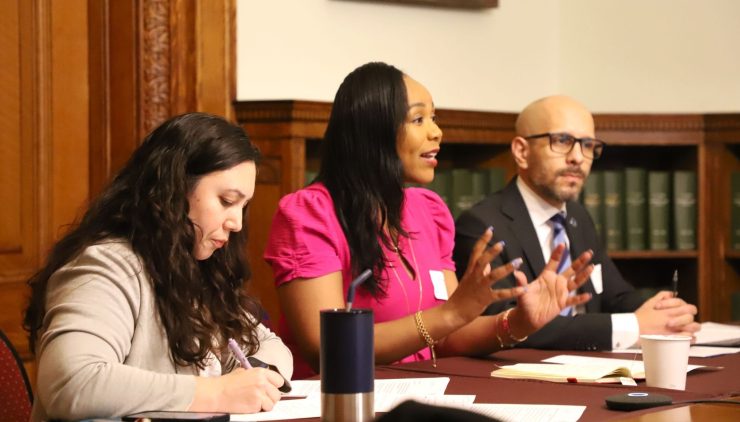
Vance Center Senior Staff Attorney Romina Canessa, Clean Start Africa founder and CEO Teresa Njoroge, and UNODC Prison and Corrections Advisor Sarang Ahsani at the March 13, 2025, event at the New York City Bar Association. Photo: Vance Center
From March 10-21, the United Nations held its 69th session of the Commission on the Status of Women (CSW), convening international leaders to evaluate progress towards gender equality. The forum marked the 30th anniversary of the Fourth World Conference on Women and the adoption of the Beijing Declaration and Platform for Action, a landmark framework for advancing women’s rights and gender equality. The 2025 convening also coincided with the15th anniversary of the Bangkok Rules, the first global guidelines specifically addressing the treatment of women prisoners.
The Vance Center’s Women in Prison Network organized two public events in parallel with the CSW forum. These exchanges brought together legal experts, human rights advocates, and formerly incarcerated women to address the often-overlooked issue of women’s imprisonment and spotlight the rights of incarcerated women as a fundamental issue in women’s rights and human rights agendas.
Breaking Barriers: Advancing the Right to Reintegration for Women Deprived of Liberty
The first public event, held on March 13 at the New York City Bar Association and co-sponsored by its United Nations Committee, focused on reintegration challenges for formerly incarcerated women.
Vance Center Senior Staff Attorney Romina Canessa welcomed in-person and virtual participants from Chile, Brazil, Spain, Sierra Leone, Zambia, and beyond, and opened the discussion by emphasizing the Network’s commitment to advancing reintegration as a fundamental human right and to continue raising visibility around this at the global level. She noted that the event was an opportunity to build on the first-ever thematic hearing on the rights of incarcerated women before the Inter-American Commission on Human Rights, which Vance Center staff and Network members presented last year.
Read more about the IACHR hearing
The evening’s first speaker, United Nations Office on Drugs and Crime (UNODC) Prison and Corrections Advisor Sarang Ahsani, highlighted that prison systems around the world—designed primarily for young male offenders—consistently fail to address women’s distinct needs. He pointed to a staggering statistic: between 2000 and 2024, the global female prison population increased by 57 percent, compared to 22 percent for men. Many of these women, he noted, are incarcerated for low-risk offenses, often linked to poverty, trauma, or gender-based violence.
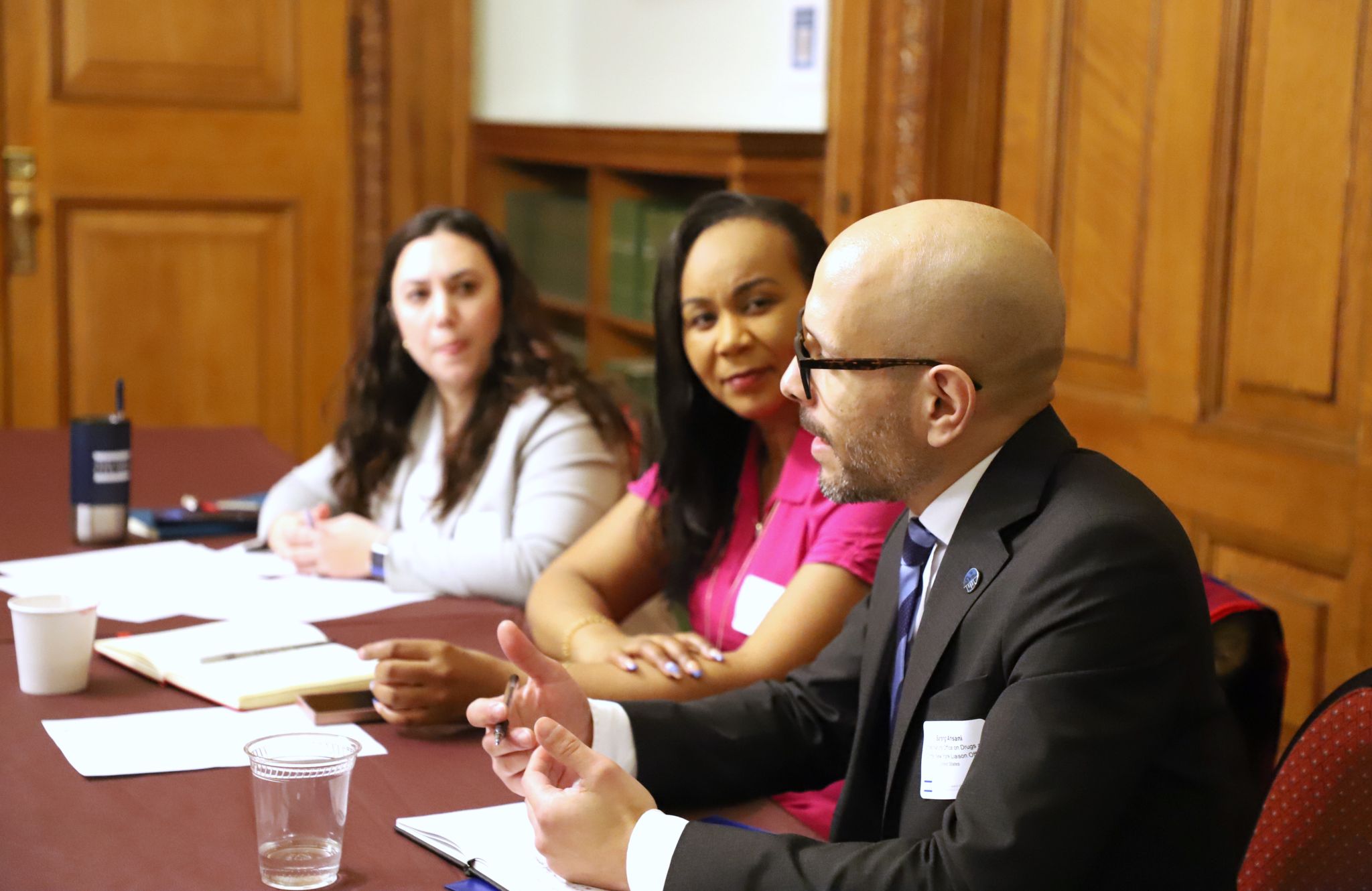
UNODC Corrections Advisor Sarang Ahsani speaks at the March 13, 2025, event at the New York City Bar Association. Photo: Vance Center
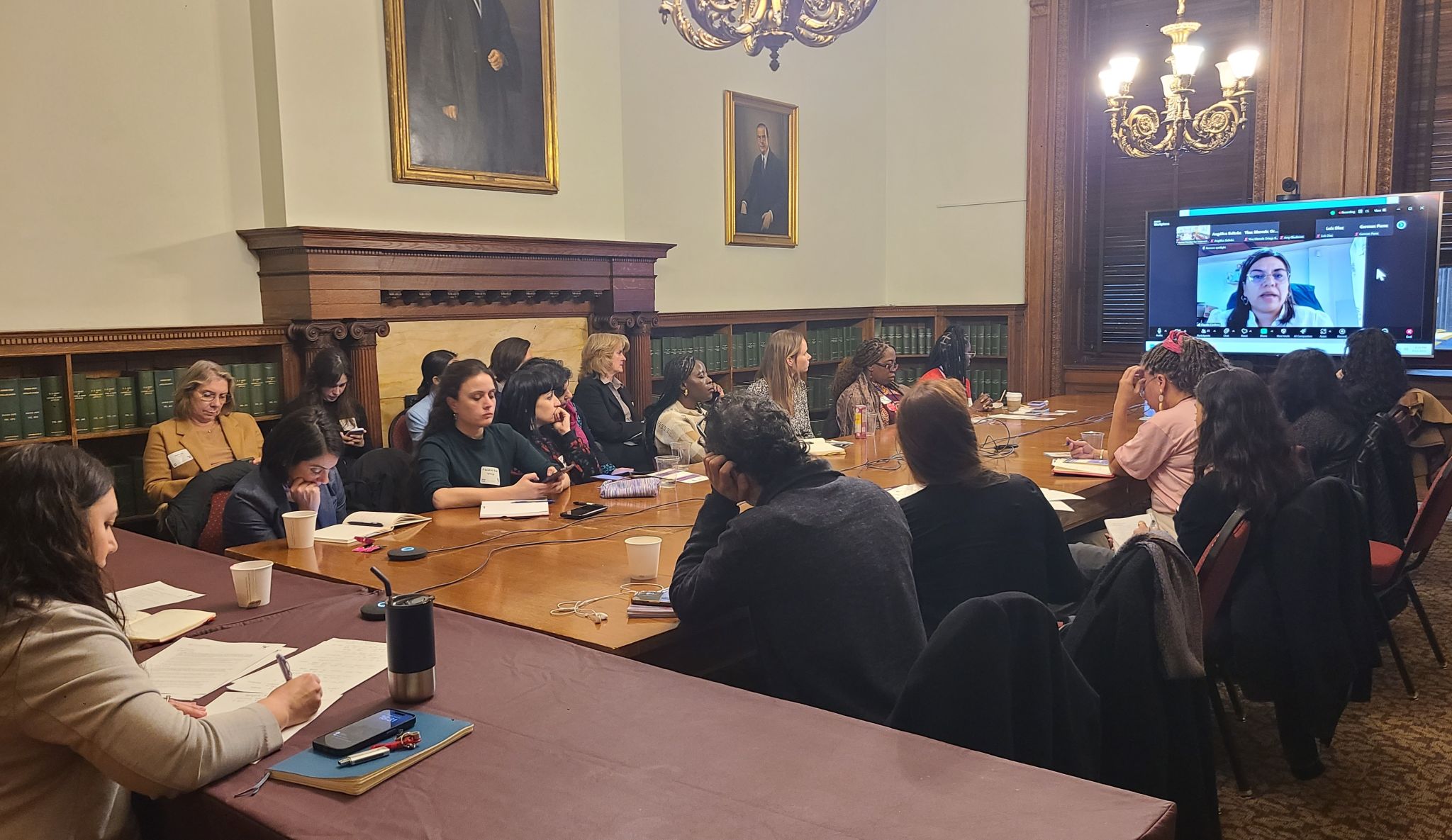
Participants listen to Mujeres Libres Colombia founder Claudia Cardona at the March 13, 2025, event at the New York City Bar Association. Photo: Vance Center
Joining virtually, Claudia Cardona, founder of Mujeres Libres Colombia, described the significant barriers women face upon release from prison in Colombia, from housing discrimination to employment challenges. She noted that, in practice, access to these fundamental services is often contingent on whether individuals have a criminal record. For example, individuals with a criminal record can overcome administrative barriers to renting if they have a third party to co-sign agreements, but persistent stigma toward people who have been incarcerated may discourage their family members from doing so. Cardona emphasized that research and conversations with formerly incarcerated women in Colombia have demonstrated the immense psychosocial toll that imprisonment and these kinds of post-release experiences have on a woman’s ability to reintegrate.
Clean Start Africa founder and CEO Teresa Njoroge echoed these concerns, noting how colonial-era prison infrastructures in Kenya exacerbate hardships for incarcerated women—70 percent of whom are imprisoned for petty offenses, and 90 percent of whom are mothers. Njoroge warned that women in prison are a demographic that “continues to be forgotten,” and underscored the devastating ripple effects of incarcerating women, as the impact extends to their children, families, and communities. Many women, she noted, are initially imprisoned for defending themselves against gender-based violence, loitering, or engaging in informal economic activities, only to face steep reintegration barriers upon release, including rigid obstacles to access jobs or housing and entrenched social stigma.
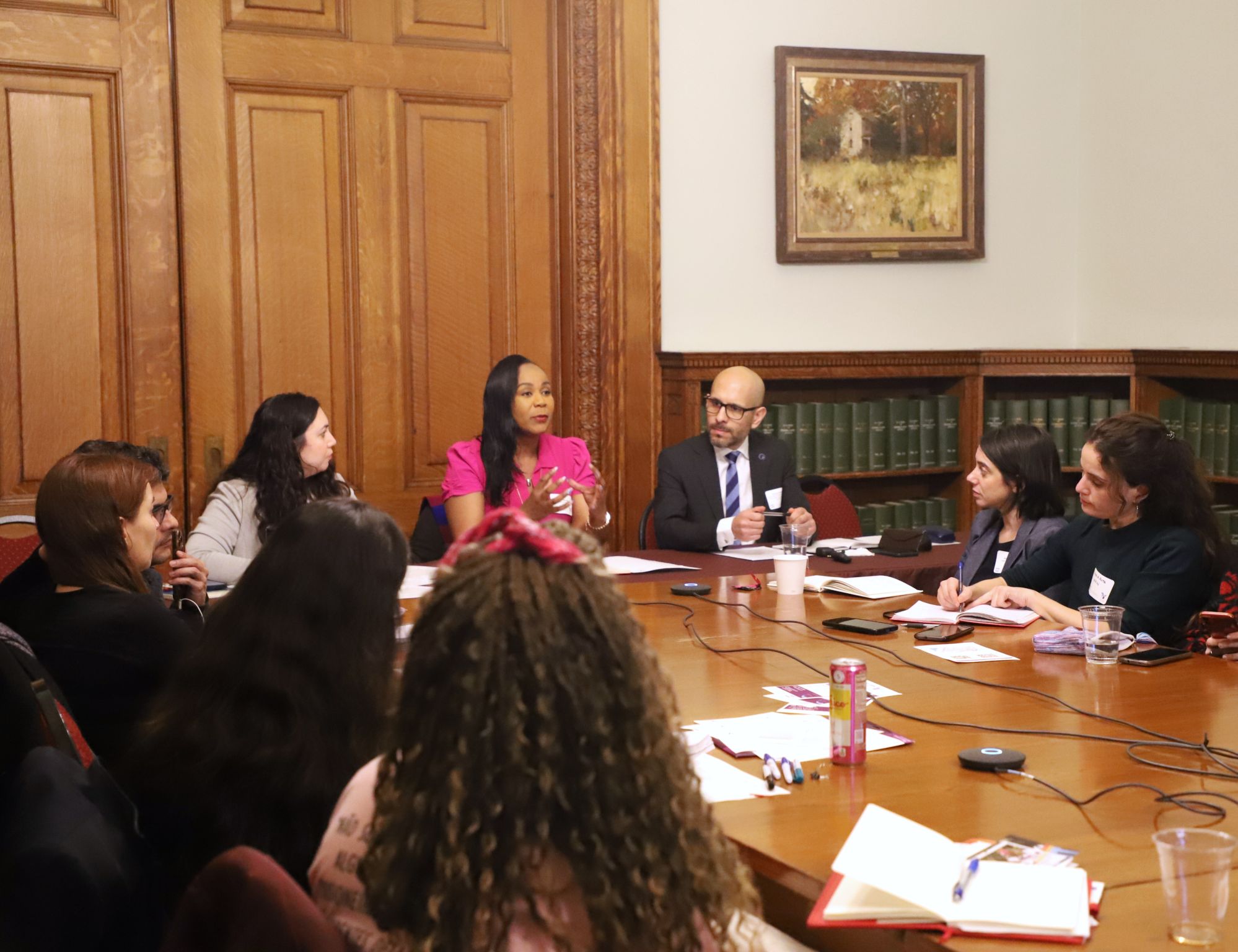
Clean Start Africa founder and CEO Teresa Njoroge speaks at the March 13, 2025, event at the New York City Bar Association. Photo: Vance Center
In closing remarks, speakers stressed that justice systems must move beyond punitive policies and recognize the structural inequalities that impede women’s ability to reintegrate into society once they are released from prison. Participants also emphasized the need to ensure the issue of women’s imprisonment is present at forums like CSW, noting that many spaces that address gender equality continue overlooking the critical issue of women’s imprisonment and its impacts.
See more photos from the March 13 event here
From Justice to Freedom: Innovative Global Approaches to Address Challenges Faced by Women in the Criminal Justice System
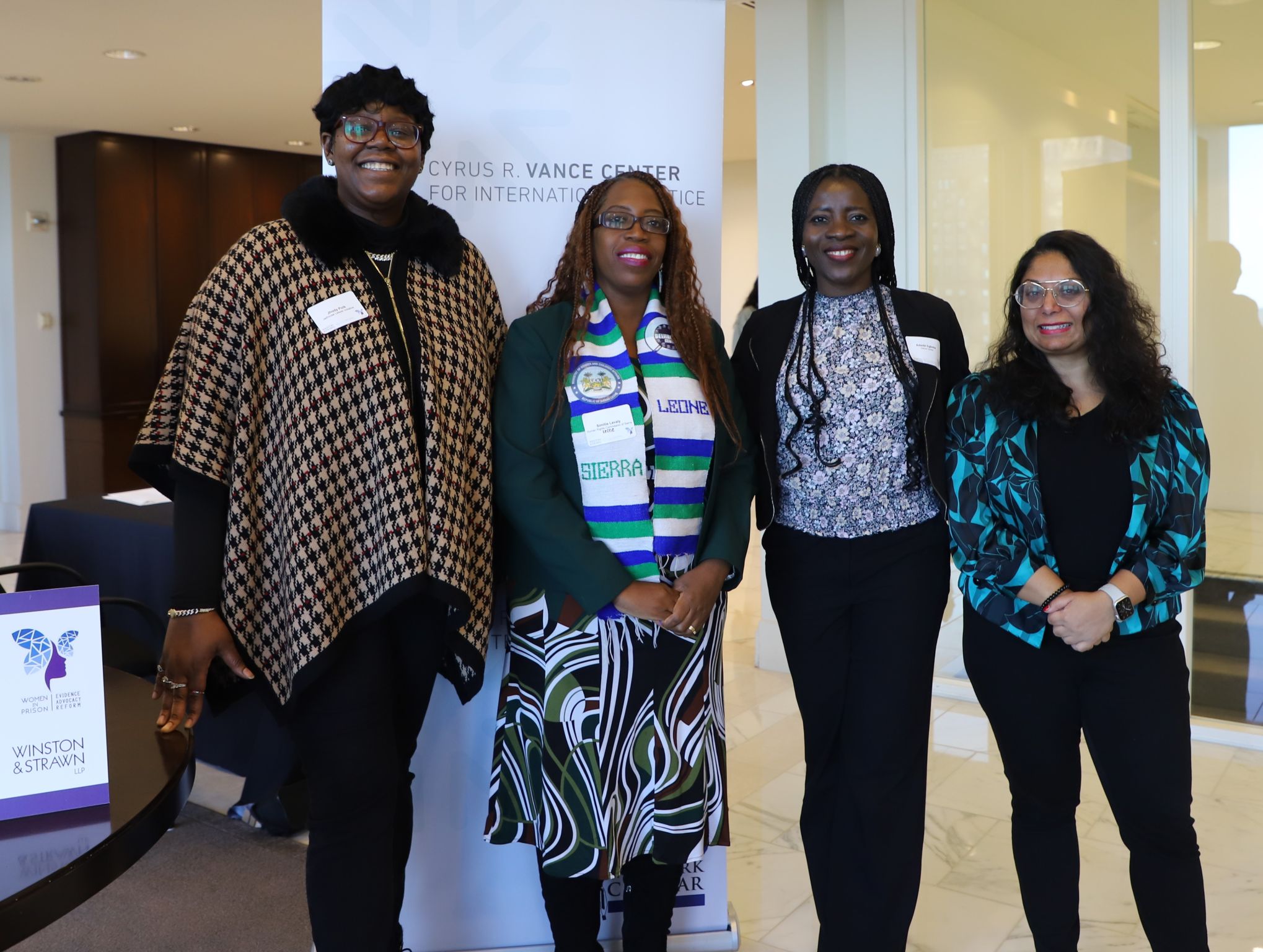
Speakers at the March 18 event: Jailhouse Lawyer Initiative founder Jhody Polk, Sierra Leone Human Rights Commissioner Simitie Lavaly, Vance Center Africa Program Director Adaobi Egboka, and Women Beyond Walls founder Sabrina Mahtani, at the Winston & Strawn offices in Manhattan, March 18, 2025. Photo: Vance Center
The second event, held in partnership with Winston & Strawn LLP on March 18, explored global innovations to address the unique challenges faced by women in the criminal justice system at every stage, from initial contact with law enforcement to incarceration and post-release reintegration.
Following welcome remarks by Winston & Strawn Pro Bono Counsel Tara Moss, Vance Center Africa Program Director Adaobi Egboka set the stage by emphasizing the importance of cross-regional collaboration to develop solutions that support justice-impacted women.
Sabrina Mahtani, founder of Women Beyond Walls, a global collaborative that works to end the mass incarceration and over-criminalization of women worldwide, opened the discussion presenting findings from the organization’s recent report on how poverty, gender-based violence, mental health struggles, and systemic discrimination push women into incarceration. Building on the report’s findings, she called for alternatives to imprisonment, such as community-based rehabilitation, centering women with lived experiences in research and policy reforms, and decriminalization of poverty-related offenses. She also underscored the importance of participatory data collection to develop accurate responses, particularly in regions like the Caribbean, the Middle East, and North Africa, where gender-disaggregated data is scarce.
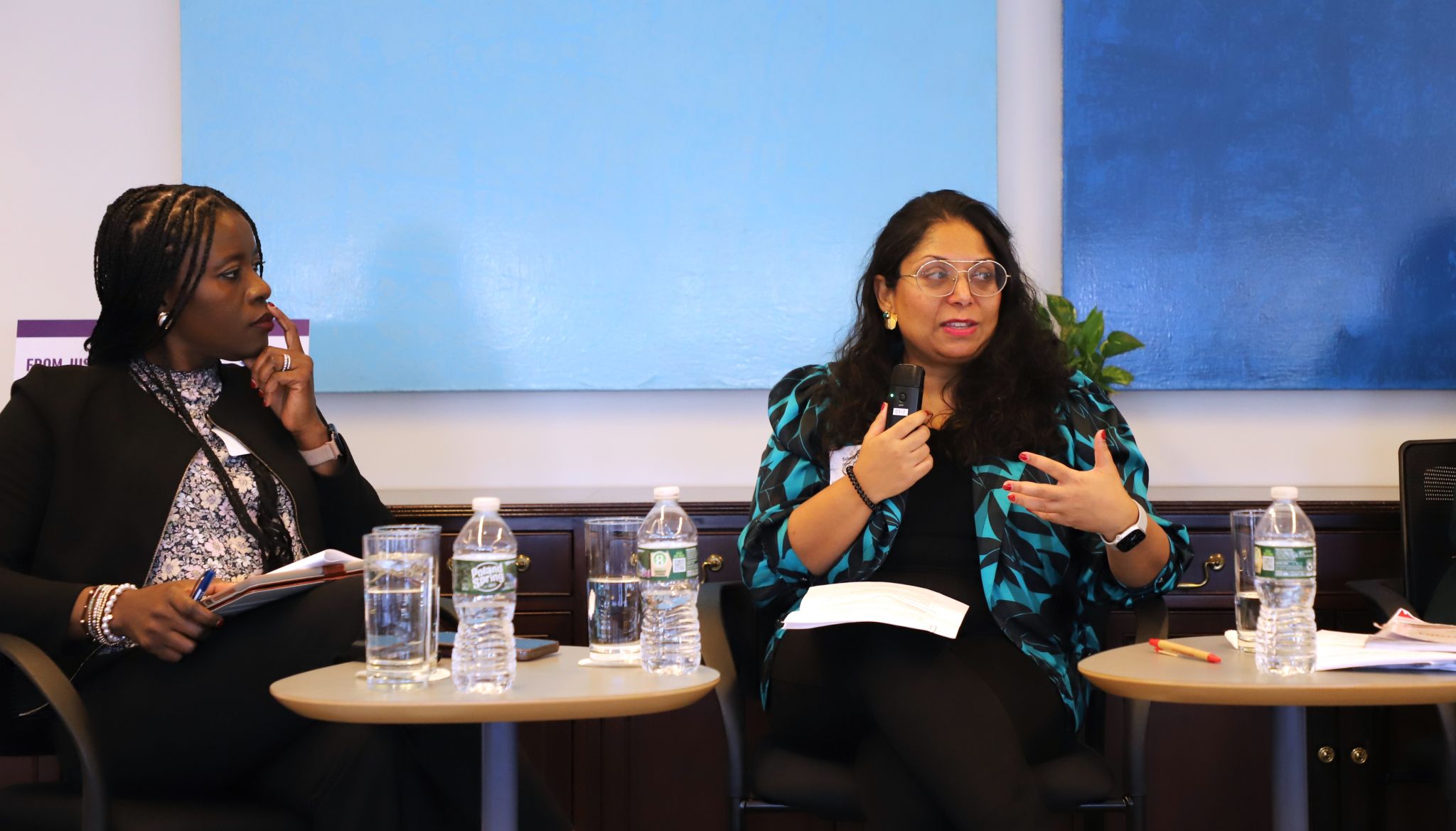
Vance Center Africa Program Director Adaobi Egboka, and Women Beyond Walls founder Sabrina Mahtani, March 18, 2025. Photo: Vance Center
Commissioner Simitie Lavaly of the Human Rights Commission of Sierra Leone detailed how legal aid and policy reforms are improving outcomes for women in her country. She emphasized the role of paralegals in ensuring legal representation for women in the justice system, from arrest through trial, and highlighted national-level efforts to align bail regulations with the Bangkok Rules. She noted that many women are imprisoned for poverty-driven offenses, and ongoing stigma often prevents them from accessing post-release support.
Commissioner Lavaly underscored the importance of training members of the judicial system on gender-sensitive sentencing and community-based alternatives to incarceration as a critical step toward reform. She also pointed to successful legal literacy programs that empower women to assert their rights in court, demonstrating the impact of strategic litigation and persistent advocacy in transforming Sierra Leone’s justice system for these women.
Jhody Polk, founder of the Jailhouse Lawyer Initiative at the NYU School of Law, spoke about the framework of legal empowerment to address injustices in prisons and throughout the criminal justice system. The initiative aims to address the fact that many people in contact with the criminal justice system often lack knowledge of their rights and how to defend them. JLI combines legal education, movement building, participatory research, and advocacy to bring visibility to jailhouse lawyers and ensure they have the resources to know, use, and shape the law.
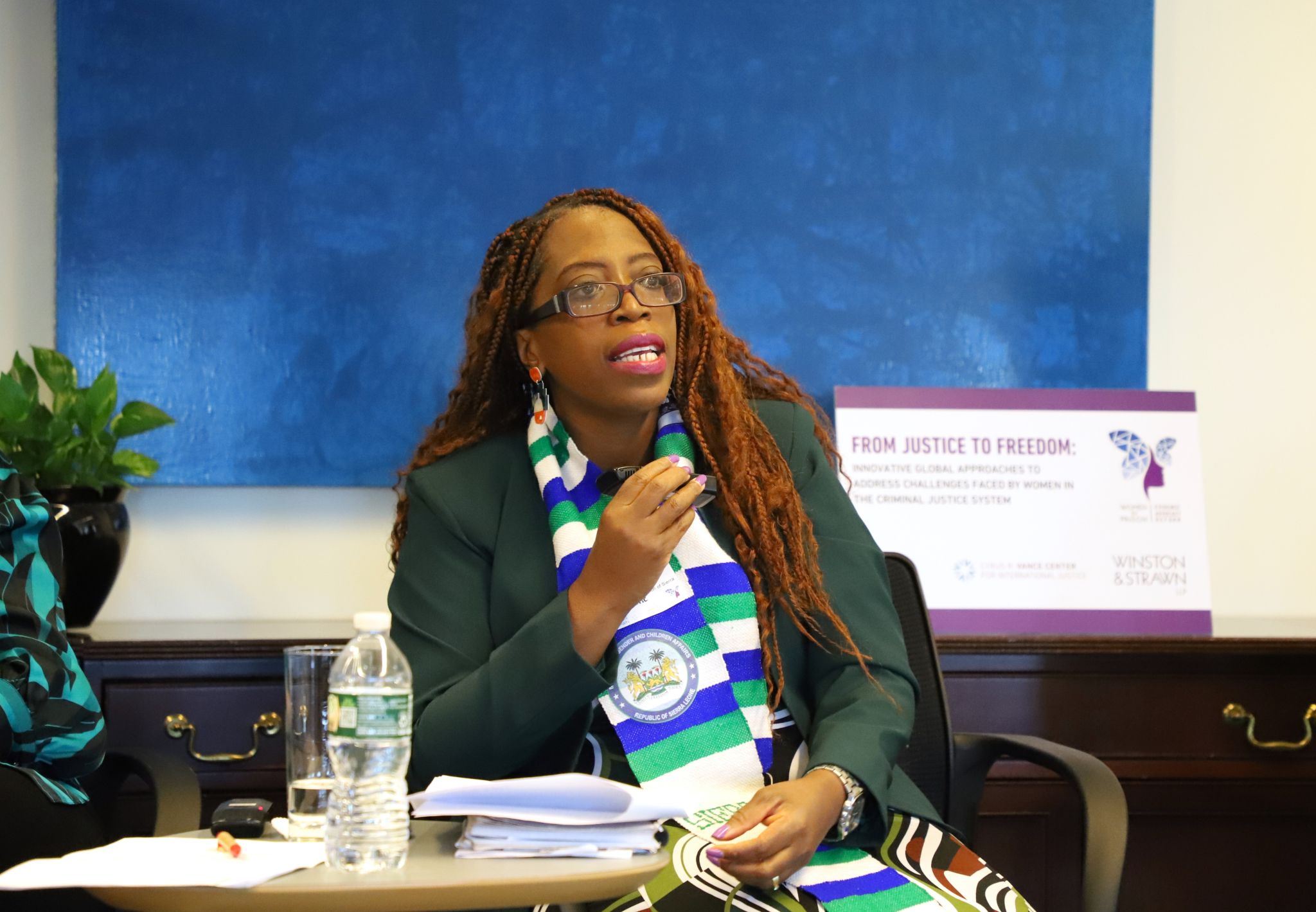
Commissioner Simitie Lavaly speaks at the March 18 event. Photo: Vance Center
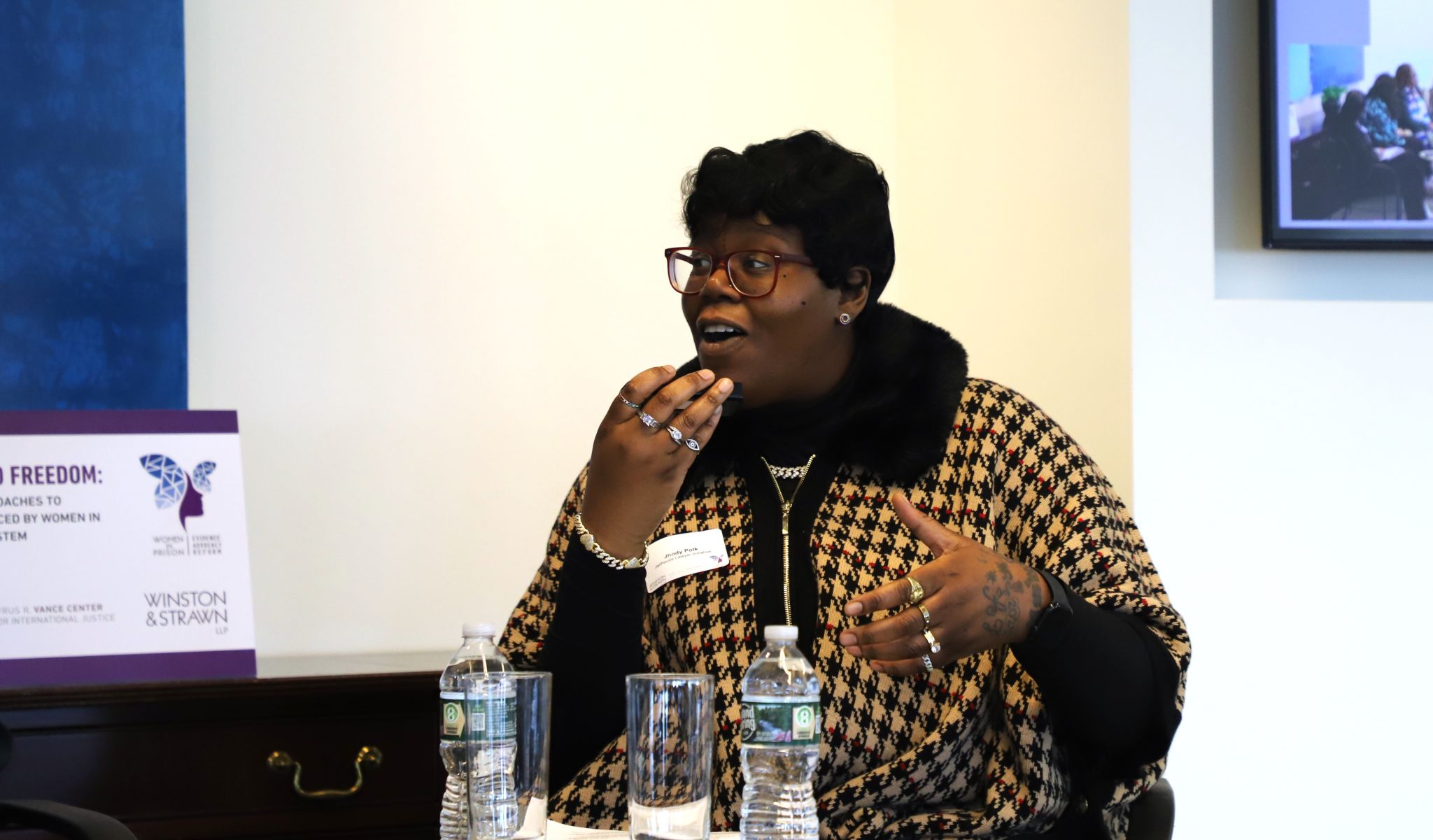
Jailhouse Lawyer Initiative founder Jhody Polk speaks at the March 18 event. Photo: Vance Center
Polk recounted her journey from incarceration to advocacy, drawing on her own experience as a jailhouse lawyer to emphasize how legal education shifts power dynamics and can help women reclaim agency over their futures. She highlighted how JLI’s approach fosters a ripple effect as formerly incarcerated women become community advocates and policy influencers, driving systemic change from the ground up. She called for greater investment in grassroots legal education, stressing that understanding the law is crucial to dismantling injustices against women in the criminal justice system.
Isabel Maldonado Cepeda, Implementation Leader for Law 2292 of 2023 at Colombia’s Ministry of Justice, discussed the country’s recent reform efforts aimed at reducing punitive measures against women entangled in the system. She highlighted the 2016 peace accords as a critical moment in Colombia’s shift toward more gender-responsive policies, including alternatives to incarceration for female heads of households. In contrast with Colombia’s historically punitive approach, Maldonado emphasized more recent success implementing alternative legal frameworks that address women’s unique socio-economic realities.
Law 2292, known as the Public Utility Law, creates a pathway for incarcerated women who are heads of their households and fulfill several other requirements to serve their sentences through community service, rather than in prison. To date, more than 130 women have been released from prison in Colombia to complete their sentences with community service under this law.
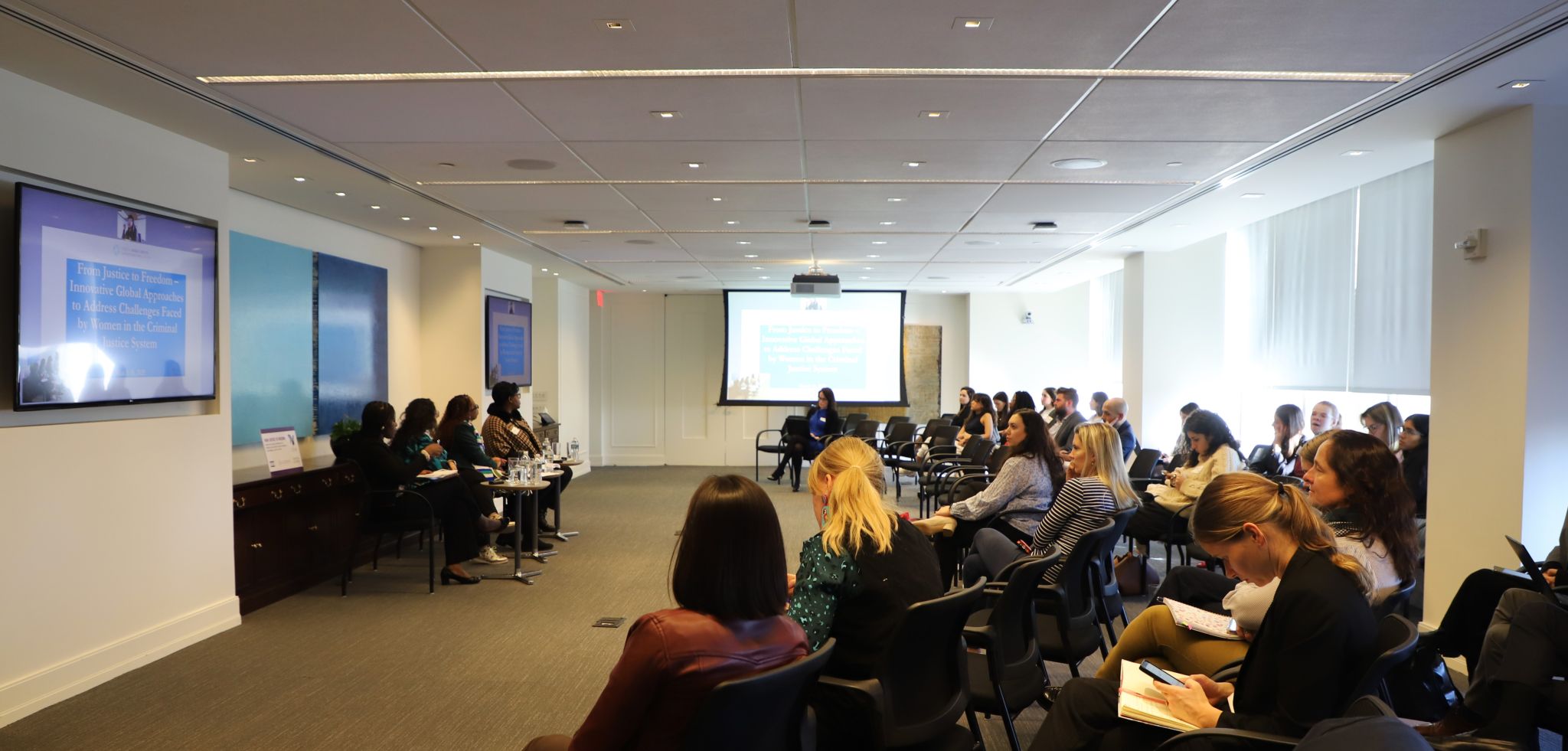
Attendees listen to speaker Isabel Maldonado Cepeda of the Colombian Ministry of Justice, during the March 18 event. Photo: Vance Center
Maldonado noted that many women who end up incarcerated initially committed criminal offenses out of economic necessity. She stressed the urgent need for reforms that acknowledge these economic pressures and prioritize rehabilitation and opportunity over punishment. She also highlighted official statistics finding zero instances of recidivism among the 134 women released under the Public Utility Law, illustrating the effectiveness of such alternative approaches.
The event underscored the urgent need for global, gender-responsive reforms that prioritize alternatives to incarceration through legal empowerment and community-based support.
See more photos from March 18 here
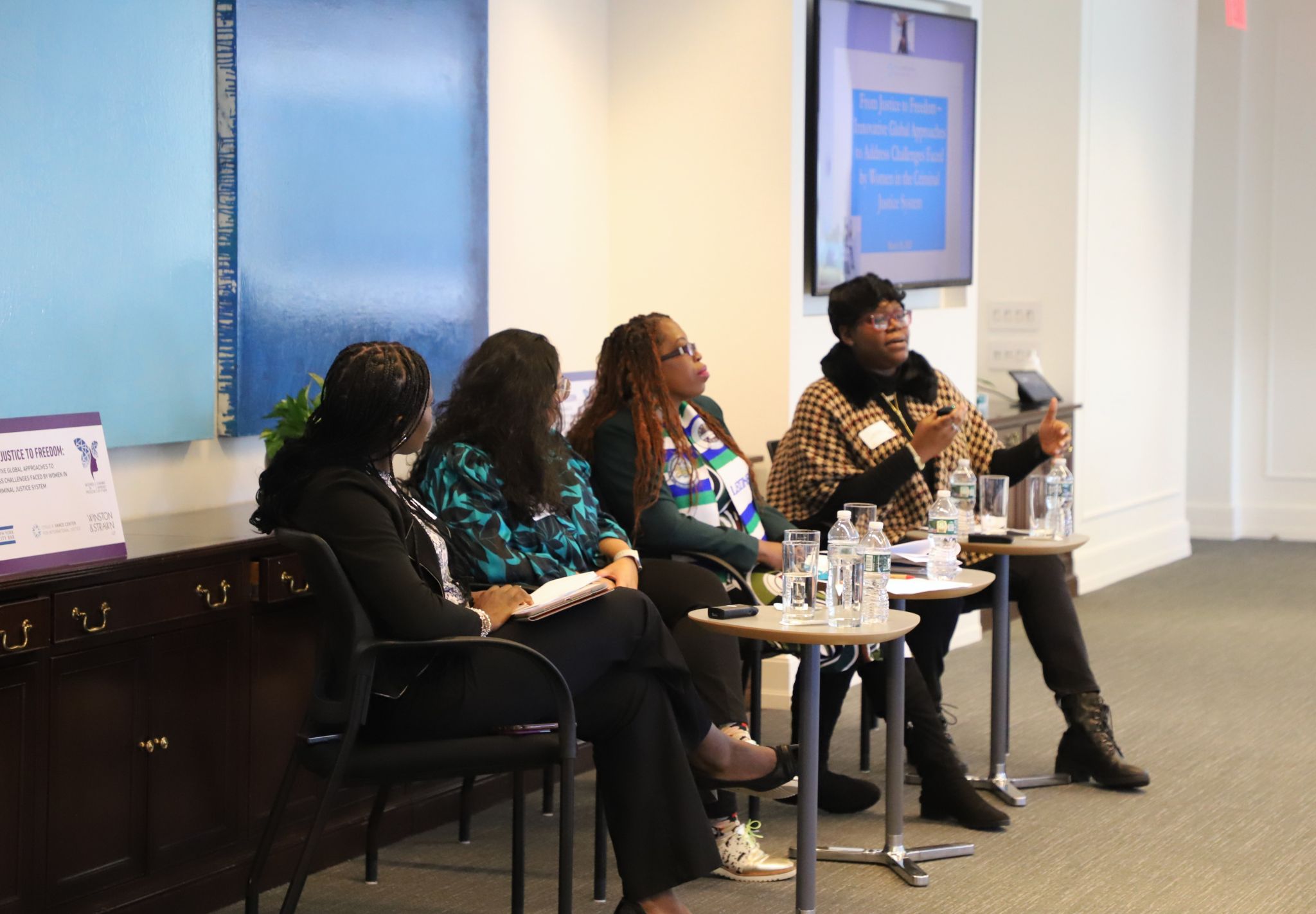
Speakers at the March 18 event, “From Justice to Freedom.” Photo: Vance Center
Throughout the week, both discussions made clear that women’s incarceration is not just a criminal justice issue, but a matter of gender equality and human rights.
The Vance Center and its Women in Prison Network remain committed to advancing systemic reforms that prioritize alternatives to incarceration. Through these initiatives, Network members and our partners will continue urging policymakers and advocates to place the rights of incarcerated women at the forefront of international human rights and women’s rights agendas.


